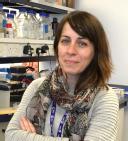Seminar: Surviving with extra centrosomes – One size does not fit all
16 November, 1.00pm-2.00pm, GLT2, Medical School Buiding
Dr Susana Godinho, Centre for Molecular Oncology, Barts Cancer Institute, Queen Mary University of London
Abstract
The centrosome is the main microtubule-organising centre in animal cells; important to assemble a bipolar mitotic spindle ensuring proper chromosome segregation and genomic stability. Whereas correct centrosome number (1-2) is tightly maintained in normal cells, cancer cells usually have an increased number of centrosomes (>2), termed centrosome amplification. Centrosome amplification has been correlated with aneuploidy, increased tumour grade, chemoresistance and overall poor prognosis. Cancer cells primarily adapt to supernumerary centrosomes by clustering them into two poles resulting in a “normal” pseudo-bipolar mitosis. Undermining centrosome clustering is a potential target for cancer-specific treatment. Indeed, depleting the kinesin HSET has already been shown to specifically kill cancer cells by impairing the centrosome clustering mechanism. However, it is unclear whether this process requires adaptation or it is inherent to all cell types. Using a panel of non-transformed cell lines, we observed that cells expressing E-cadherin have inefficient clustering mechanisms compared to cell lines without E-cadherin. Loss of E-cadherin (siRNA/CRISPR) promotes centrosome clustering and survival of epithelial cells with multiple centrosomes. In addition, loss of DDR1, involved in regulating cortical contractility downstream of E-cadherin, increases centrosome clustering in epithelial cells. Using Atomic Force Microscopy we confirmed that indeed loss of E-cadherin leads to increased cortical contractility in mitotic cells. Inhibition of actomyosin contractility prevents efficient clustering in cells that do not express E-cadherin, further suggesting that it is important for this process. Loss of E-cadherin and DDR1 is strongly correlated with high levels of centrosome amplification in breast cancer cell lines suggesting that these changes are part of an adaptation mechanism to centrosome amplification.
Biography
 Dr Susana Godinho studied Biology at the University of Lisbon, Portugal. She was then awarded a PhD fellowship to study the role of Polo kinase during cell division at Institute Gulbenkian of Science and University of Cambridge. After receiving her PhD in 2006, Susana moved to Boston to study the role of centrosome abnormalities in cancer in the group of Professor David Pellman at Dana-Farber Cancer Institute and Harvard Medical School. After that, Susana moved to London where she has been a Group Leader at Barts Cancer Institute - Queen Mary University of London since 2013. Susana’s laboratory focuses on understanding the relationship between centrosome amplification and cancer, in particular how centrosome amplification contribute to tumour progression. On of the aims of Susana’s research is to understand the mechanisms that allow cancer cells to overcome the detrimental effects of centrosome amplification, which has the potential to lead to novel and selective therapeutic strategies.
Dr Susana Godinho studied Biology at the University of Lisbon, Portugal. She was then awarded a PhD fellowship to study the role of Polo kinase during cell division at Institute Gulbenkian of Science and University of Cambridge. After receiving her PhD in 2006, Susana moved to Boston to study the role of centrosome abnormalities in cancer in the group of Professor David Pellman at Dana-Farber Cancer Institute and Harvard Medical School. After that, Susana moved to London where she has been a Group Leader at Barts Cancer Institute - Queen Mary University of London since 2013. Susana’s laboratory focuses on understanding the relationship between centrosome amplification and cancer, in particular how centrosome amplification contribute to tumour progression. On of the aims of Susana’s research is to understand the mechanisms that allow cancer cells to overcome the detrimental effects of centrosome amplification, which has the potential to lead to novel and selective therapeutic strategies.
